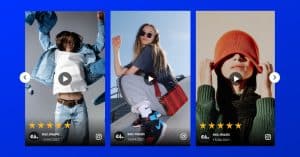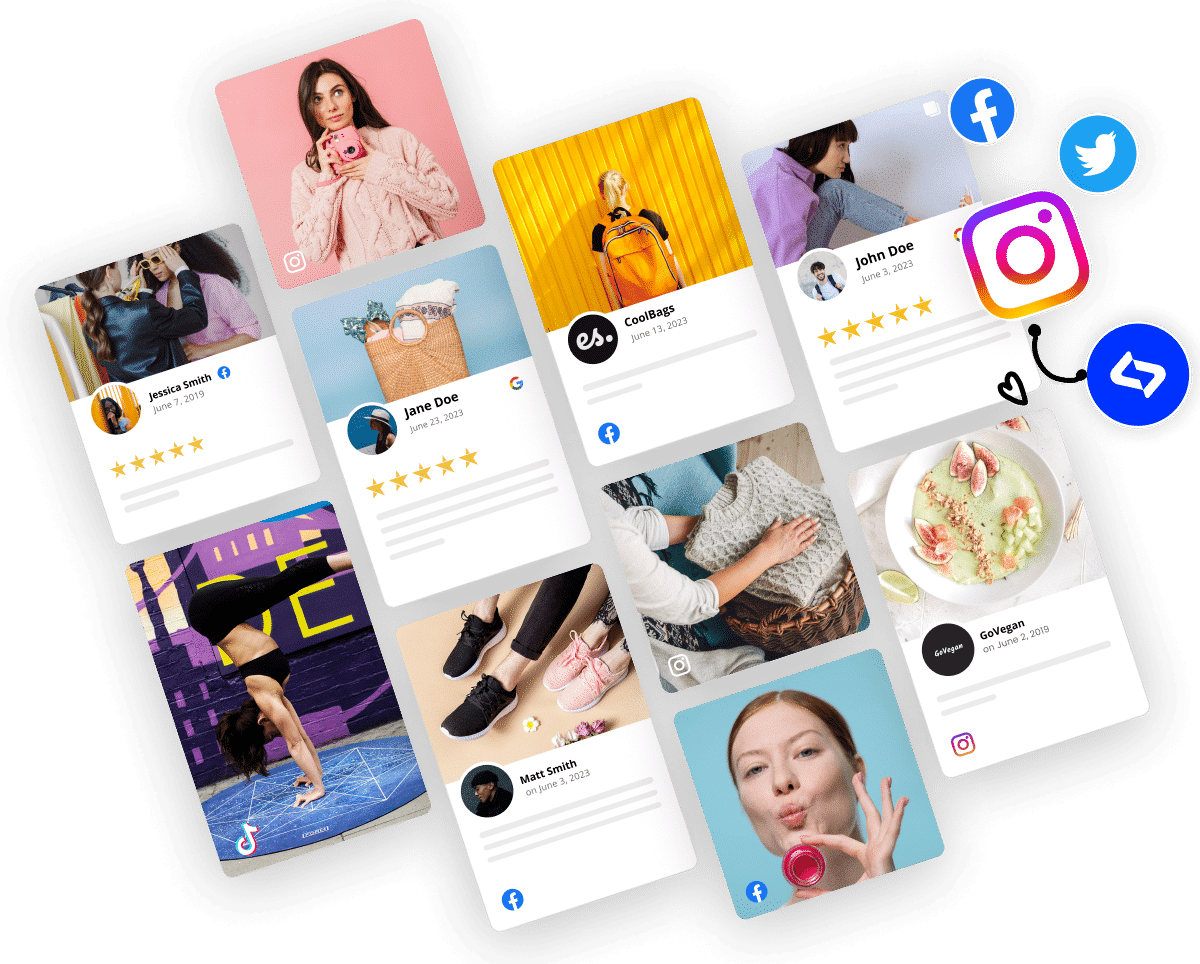Have you ever noticed how the actions and choices of our peers often influence us? That phenomenon is called social proof and holds remarkable power over our decision-making.
From the products we buy to the activities we engage in, social proof subtly guides us to correct behavior by tapping into our innate need for validation and acceptance.
Let’s dive into the psychology behind social evidence and offer 20+ practical examples of how to use social proof that you can use on your website to increase conversion rates.
What is social proof?
Social proof is a psychological phenomenon that indicates that customers form opinions and make decisions based on other people’s actions. It is a form of referral marketing where social media influencers, industry experts, or actual customers create social evidence to help you gain new customers.
Social proof meaning
The most common types of social proof are reviews, endorsements, industry expert opinions, influencer campaigns, customer success stories, and content created outside your brand, all of which are incredibly valuable and can be the difference between a conversion and an abandoned cart. After all, they add outside weight to your claims about your product.
Potential consumers are more likely to trust online reviews from other consumers who wax lyrical about your products rather than you. You, after all, have a vested interest in making a sale.
Therefore, intelligent and impactful uses of social proof can work wonders and help you increase conversions and gain loyal customers since they are not based on self-praise.
If you’re not sure where to start, here are some of the best social proof practices:
- Embed ‘Wall of love’ on your website
- Share case studies about your product
- User reviews and testimonials
- Celebrity endorsement
- Expert’s stamp of approval
- “Wisdom of the Crowds”
- Place media logos on your homepage
- Create a branded social media hashtag
- Highlight bestselling products on category pages
- Showcase customer testimonials in paid ads
FYI: You can automatically embed Google reviews widget on your website and show authentic user-generated reviews, increasing trust for more sales. Try it now.
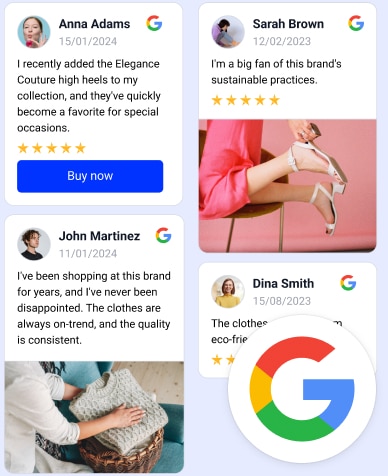
Embed Google Reviews in seconds.
Automatically generate and embed Google reviews and use AI reviews management tools to help you unlock your website’s sales potential.
Why is social proof important for marketers?
Leveraging social proof strategies can significantly amplify your brand’s credibility and customer engagement. It helps mainly to correct potential buyers’ behavior when in doubt, which is an actual goldmine for online marketing.
1. Encourages potential customers to buy
When potential buyers see existing customers vouching for your product or service, they are more likely to make a purchase. Social evidence is a great form to encourage people and provide validation, making newcomers feel more comfortable becoming customers. This is especially valid for online stores where testimonials from real customers can greatly impact buying decisions.
Increases brand trust
Testimonials, reviews, and user-generated content can serve as trust signals. When people see that others have had a positive experience with your brand, they gain more knowledge and are more likely to trust you themselves.
Boosts SEO efforts
User-generated content content is often rich in keywords and can help your site rank higher in search engine results.
Gains product or service Insights
Social evidence isn’t just about marketing; it’s also a valuable source of feedback. Customer reviews and testimonials can provide insights into what’s working and what needs improvement.
Amplifies reach through influencer marketing
Collaborating with influencers can exponentially increase your brand’s visibility. Influencers bring their own built-in audience that trusts their opinions. When an influencer endorses your product or service, you gain exposure and inherit a level of trust and credibility from their followers.
21 types of social proof to get satisfied customers
Not sure where to start? Check out these common types of social proof used nowadays:
1. Reviews and customer testimonials
Online reviews and customer testimonials are the most obvious and probably the most sought-after type of social proof. People rely on them for an honest and realistic impression of your product/service that they often feel they can’t get from your own words.
For example, if you sell real estate agent software, there’s only so much you can do via your website to convince new customers to buy. Selling houses rely a lot on each particular case and customer, so having a review collection strategy for people who have used your software in the field is vital to assure prospective buyers that your stuff will be useful.
There are many ways to use testimonials in your content. Some brands create a dedicated landing page for them. Others pepper them throughout their site. Some, like Casper below, have a carousel featured prominently on their homepage, which site visitors can scroll through to browse a range of reviews.
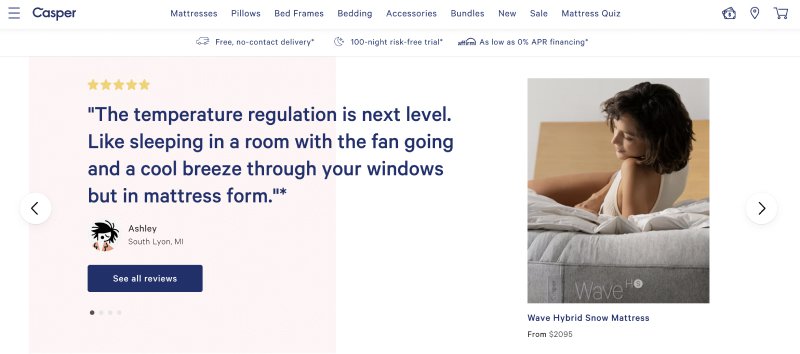
All in all, there are plenty of ways to incorporate reviews and testimonials into your content. And you should. Frankly, people will wonder what you’ve got to hide if you don’t.
Oh – one last point! Don’t feel like all your reviews have to be positive. Three-star reviews are often more valuable than five-star ones. Why? Because too many five-star reviews feel ‘too good to be true. Three-star reviews, however, are considered more ‘balanced’ and still can provide positive feedback about your brand and may refer to some other attributes in your business that you need to improve. People trust them more than excessively positive reviews. Assuming that there’s nothing terrible in your three-star reviews, folks will often buy based on them.
So don’t worry if your reviews aren’t universally awesome! A balanced mix of reviews is often better than an overwhelmingly positive skew. Just make sure to have a reviews management in place so you can make your customers happy to manage negative reviews, as they are the main reason for shoppers abandoning their carts.
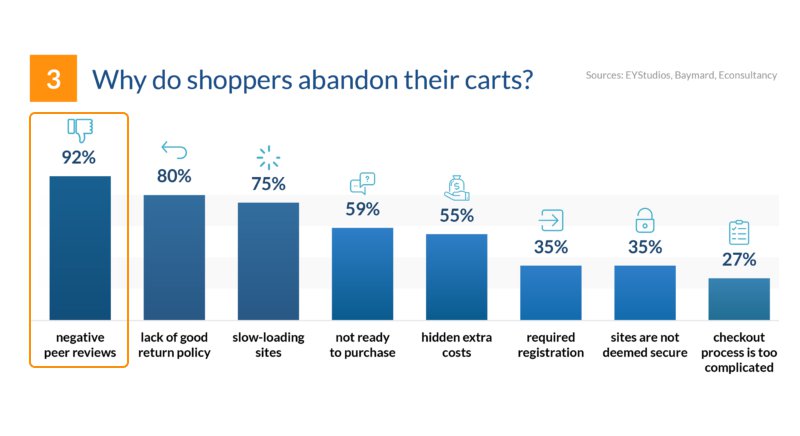
2. Case studies
With the assistance of WordPress experts, you can fill your blog and possibly a dedicated section of your website with case studies from happy customers. Trust us when we say that your conversion rate will thank you.
When they’re at the ‘research’ phase of their buying journey, customers want to know exactly how your product will improve their lives. Customer success stories help with this.
A good case study acts like an extended customer review over which you have some control. Reach out to your best customers and ask if they’d mind answering a few questions for a case study. Chances are, they’ll be delighted to help you out and get the extra exposure your case study will provide.
You can then utilize these case studies throughout your website. A dedicated page or area on your site will satisfy those individuals who search specifically for this kind of social evidence. You don’t have to limit the impact of case studies to those prospects, though.
Take, for example, our glossary page on hosted VoIP. It’s designed to provide useful information for visitors who are interested in those kinds of solutions and think they might benefit their business.
We also utilize social evidence in the form of vignettes from and links to case studies of how those exact products have helped others.
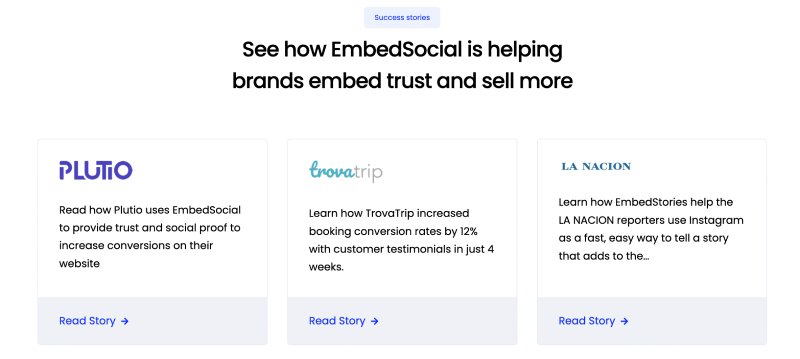
3. Affiliate promotions
Affiliate marketing involves a third party putting your product in front of its target audience. Typically, that third party would be a blogger, a website owner, or a content creator.
Affiliate promoters are paid a commission per conversion, but they still get a degree of choice about which products to recommend. In the public eye, this makes them more trustworthy than brands, as they tend to blog about affiliate products they genuinely like.
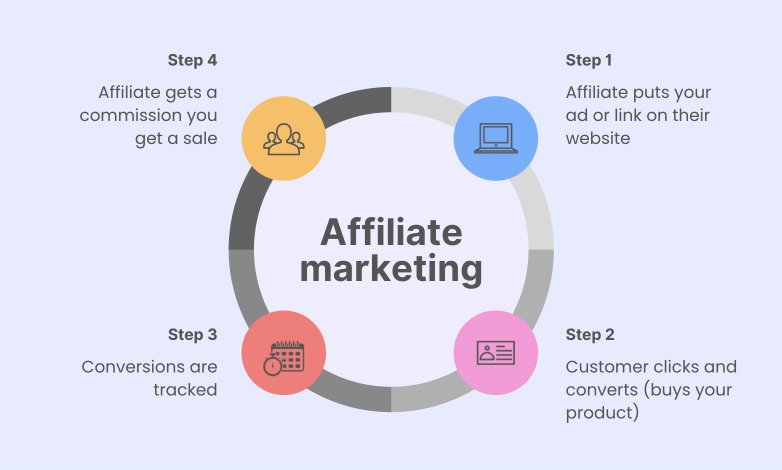
When approaching affiliate marketing, you must remember how important that feeling of trustworthiness and authenticity is to potential consumers. While you are entering into a partnership with affiliates, be discerning when selecting them. Try to work with affiliates who have used and loved your products as much as you can. That genuine care for your products and brands will shine through to their readers or followers.
Those readers or followers will then be much more inclined to follow affiliate links to your website and product pages. Pre-primed with a glowing endorsement of your brand from someone they trust, they’ll then be more likely to make a purchase, sign up for your service, or get in touch. That’s where affiliate promotions start to maximize the potential of your site.
4. Celebrity social proof
Celebrities and influencers already have an audience and – if they’re any good at what they do – a positive relationship with that audience. If you pick your celeb/influencer well, you can leverage their social followers and relationships to your advantage. Nowadays, when a celebrity endorses a brand for example, in an Instagram post, it is like making personal recommendations. This is very common because celebrities want to be sure of the value of a product before they promote it on their public social media profiles.
The Audiobook brand Audible, is a great example to study in general if you want to know how to use any social proof examples, but they’re particularly fantastic at influencer and celebrity endorsement. They have become the world’s number one audiobook streaming platform by offering prominent YouTubers and podcasters sponsorship in exchange for a quick signal boost.

When choosing this route, it is worth understanding the differences between B2B and B2C marketing. Typically, celebrity and influencer marketing works best for B2C businesses – for B2B marketing, you might be better off with things like expert recommendations (more on those later).
That’s because B2C marketing is often more about eliciting an emotional response from prospects, and seeing a favorite celeb promoting a product can do that. B2B marketing is more about reason, logic, and persuasion. However, this does depend a lot on the nature of your business!
5. UGC
If you can get UGC (user-generated content) right, you’re onto a winner. Using your customers’ own brand-related content as social Influence is a fantastic way to build trust, build community, and drive conversions.
The dog brand BarkBox is incredible at UGC. They regularly post their users’ photos, memes, videos, and more. This not only gives them a constant stream of great content, but it also drives up their organic reach as users share ‘their’ BarkBox posts to their own socials.
If you do something like BarkBox and do UGC right, everybody wins. BarkBox gets genuine, organic UGC that works as fantastic proof; the user who generated the content gets a signal boost, and everyone’s organic reach is improved.
Perhaps best of all, BarkBox shows authentic users enjoying their content. This builds trust, helps them to engage with their user base, and creates a great sense of community around their product.

Where does maximizing the potential of your website come in?
Good question. The answer is in two parts. Firstly, you can link and direct social media followers to your site directly from threads, including posts using UGC. Second, growing your social media following by interacting with and utilizing UGC can boost traffic to your website.
After all, the kind of community it creates will boost your brand awareness. That can, in turn, enhance branded traffic to your site, and that’s something search engines notice when ranking your pages.
Including such elements on your site isn’t complicated, either. Any business can embed a Twitter carousel linked to their hashtags on their pages to provide social proof from Tweets shared by actual customers.
6. Expert recommendations
Of all social influence examples, industry expert social proof, testimonies, and recommendations are the hardest to come by. For a start, your product needs to be relevant to the expert’s field for their testimony in order to work. There is no point in getting a creative writing professor to talk about how much they love your brand of socks. Well, not unless they’ve written a great book about socks at some point in their career.
Expert testimony is particularly useful in B2B marketing. Having a respected industry figure coming out in favor of your product will work wonders for your brand.
In-depth expert testimony won’t be offered unless your product is fantastic. After all, experts have a reputation to maintain and won’t lend their authority to anything that doesn’t meet their approval.
However, if you impress an expert, publicizing and sharing their help will impress your existing customers and those website visitors that you’re looking to convert.
Here is an example of expert recommendation products: Dr.Huberman has partnered with Momentus supplements, and on their website, you can find a full section of Huberman Kit of products recommended by him:
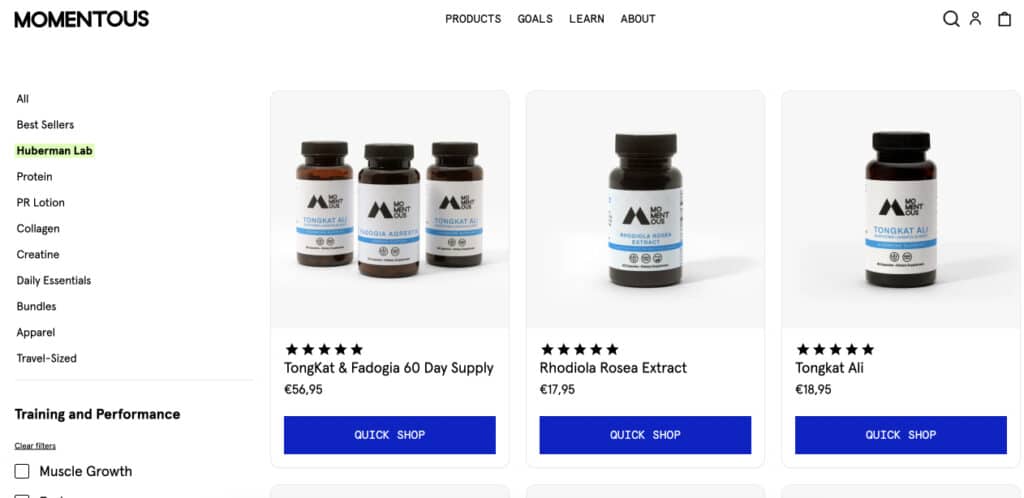
7. Certifications
Social proof serves to cement trust between the brand and the customer. They say, ‘This product is good. Here’s a second opinion that proves it. But social proof doesn’t always have to come from customers.
Certifications also serve as third-party affirmations. Customers know that you have to fulfill certain criteria to get a certificate, so displaying that certificate is very reassuring.
Things like a certification of ISO compliance, food safety, and hygiene certificates, security verifications, academic qualifications, association memberships, and guild memberships…all serve as valuable social proof showing your business to be valid, trustworthy, and legitimate.
Don’t be shy of showing off the certifications your business has achieved or the compliance standards you meet. For example, in a recent blog post on free video conferencing tools, we chose to draw attention to our GDPR and SOC2 compliance:
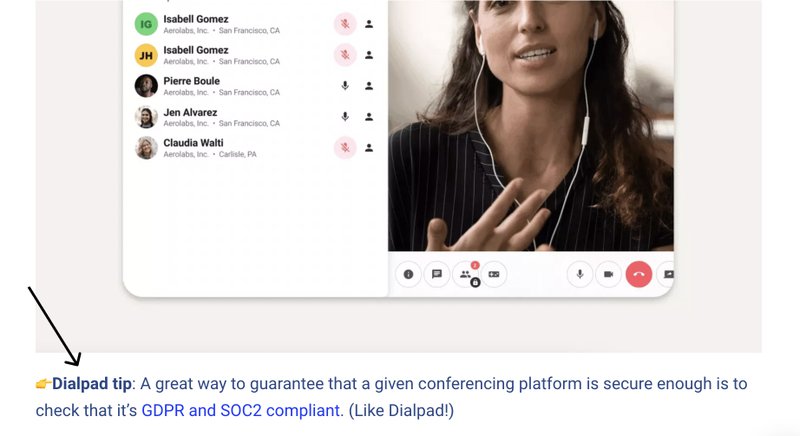
It’s a potential point of difference between ourselves and some rivals. And, like all these examples of social proof, it is a way to build more trust with site visitors. It’s only visitors who trust you, after all, that you may be able to turn into customers.
8. Real-time or recent activity
By showcasing real-time or recent activity on websites and apps, businesses create a sense of urgency and trust that significantly influences users’ decisions. The dynamic display of purchases, sign-ups, or interactions instills a fear of missing out and validates the popularity of a product or service, compelling users to follow suit and take immediate action.
For example, Udemy has currently put what students are viewing on their websites.

9. Influencer endorsements
Influencers hold remarkable power when it comes to shaping consumer behavior. Their ability to build a loyal following and establish credibility makes their endorsements highly influential.
Influencers tap into their followers’ trust and admiration by aligning their personal brand with a product or service. When an influencer promotes a particular brand or recommends a product, their audience is more likely to perceive it as authentic and trustworthy. This endorsement has the potential to sway consumer decisions, driving them to engage with and make purchases based on the influencer’s recommendation.
The skin care company Cerave has partnered with Charli D’Amelio, one of the top influencers for TikTok UGC campaigns, reaching a whole new audience through D’Amelio’s account:

10. Media mentions
Media coverage is another great way to establish credibility and social proof as a business. When a company receives positive mentions in the media, it gains visibility and validation in the eyes of the public. Such coverage serves as a stamp of approval, signaling that the business is reputable and trustworthy.
A scenario where a business garners positive media mentions increases its brand recognition and bolsters its social proof, influencing consumers to view it as a reliable and noteworthy choice.
Check out celebrity trainer Kit Rich’s website, for example:
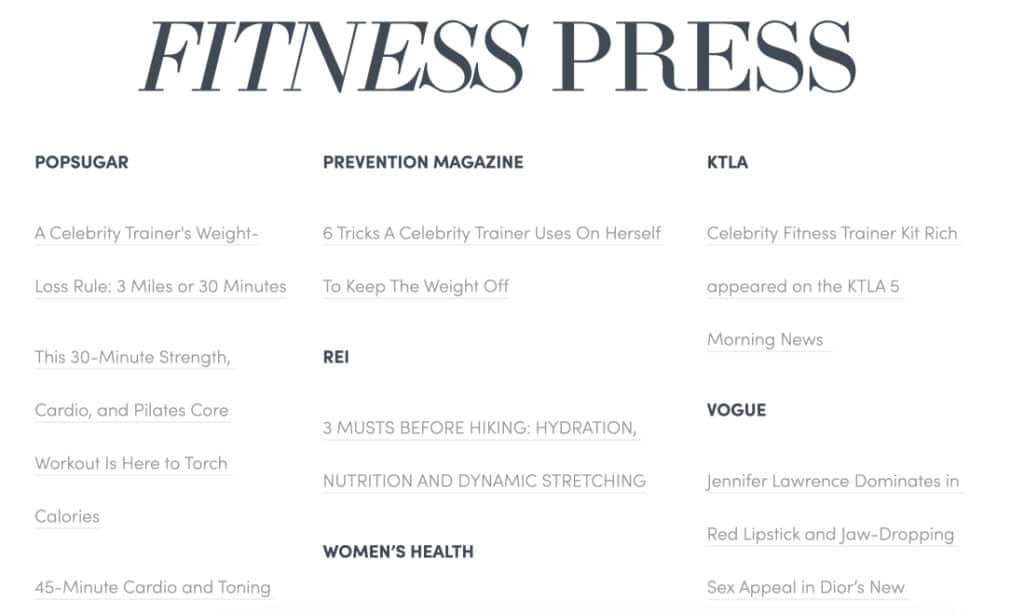
11. Certifications and badges
Displaying certifications and badges enhances trust and social proof by providing tangible evidence of a company’s credibility. When a business showcases relevant certifications, such as security certifications for a software company, it instills confidence in potential consumers.
By demonstrating compliance with industry standards and best practices, these certifications validate the company’s commitment to security, fostering trust and reassurance. This, in turn, influences customer perceptions, as they feel more confident in choosing a company that can substantiate its claims through recognized certifications.
Just take a look at this example from Athletic Greens:

12. Client logos
Using well-known client logos as a form of social proof is another powerful strategy to build trust and credibility. When a service provider prominently displays logos of reputable clients, it conveys that these established brands have placed their trust in the provider’s services.
This visual association enhances the service provider’s credibility, as potential consumers perceive that if respected companies have chosen them, they too can rely on their expertise and quality. Here is an example from Notion’s website, where you can see big names using their platform, like Figma, Toyota, uber, Pinterest, Amazon, Nike etc.
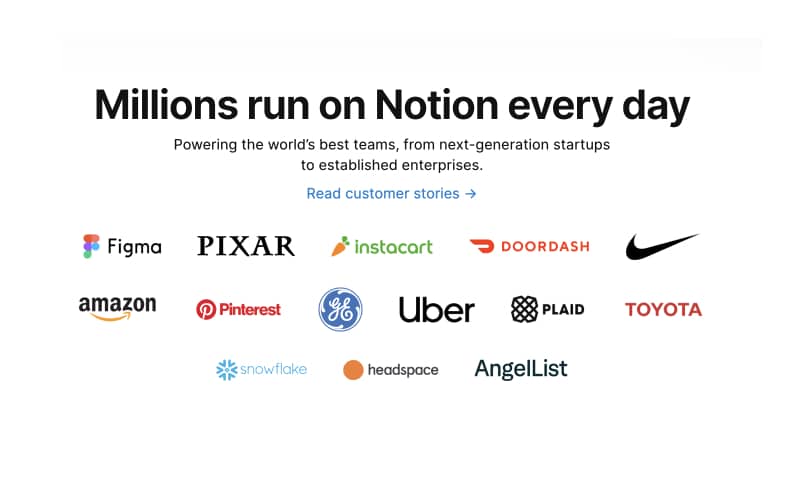
13. Number of customers or users
By showcasing a large customer base, a subscription-based service, for instance, creates a perception of trust and desirability.
When potential customers see that a significant number of users have already subscribed, it reinforces the notion that the service is valuable and worth signing up for. This social proof encourages new sign-ups, as people are more inclined to trust a service with a substantial user base.
Here is an example user social proof, with a rating badge with user photos and the number of users on the EmbedSocial platform:
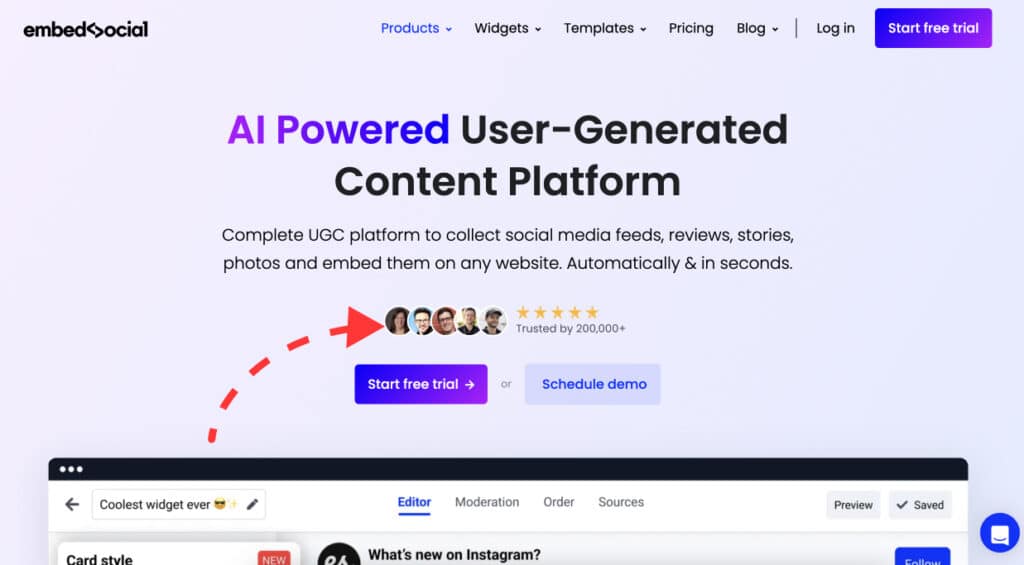
14. Before-and-after demonstrations
Before-and-after demonstrations are highly effective in various industries as they visually showcase a product’s or service’s transformative power.
In the fitness industry, for example, a product displaying impressive transformations captures the attention of potential customers and convinces them of its efficacy.
By presenting tangible evidence of the desired outcomes, before-and-after demonstrations serve as compelling social evidence, demonstrating the potential benefits and motivating individuals to engage with the product or service.
Here is an example of the before-and-after social proof section on the website of a dental care clinic:
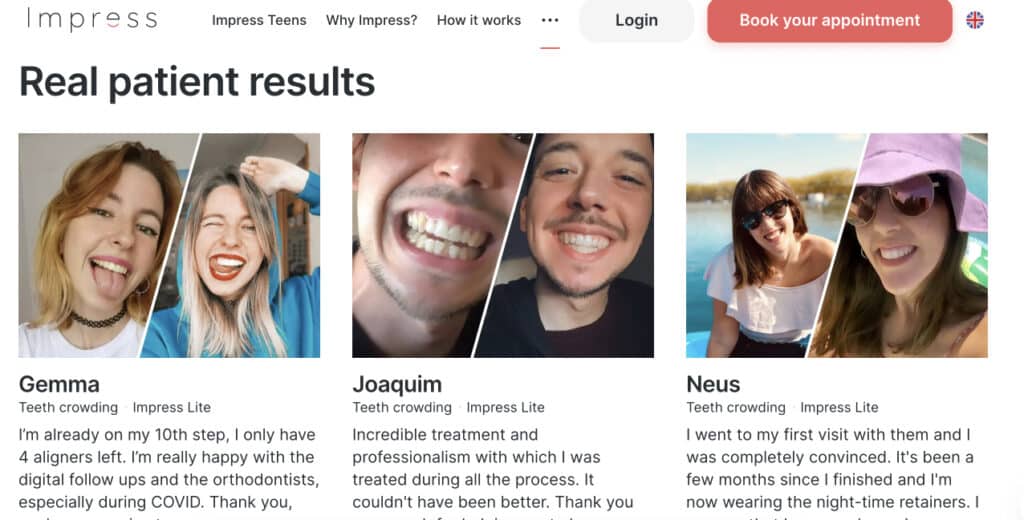
15. Test scores
Displaying test scores or ratings can significantly influence decision-making. In the realm of education, an educational platform showcasing high test scores attracts new users by demonstrating its effectiveness.
By highlighting impressive scores and ratings, the platform establishes credibility and social proof, assuring potential users of its ability to deliver positive outcomes. These test scores serve as a powerful motivator, enticing individuals to join and benefit from the platform’s proven track record of success.
Here is an example of how to use test scores as a social proof example on your website:
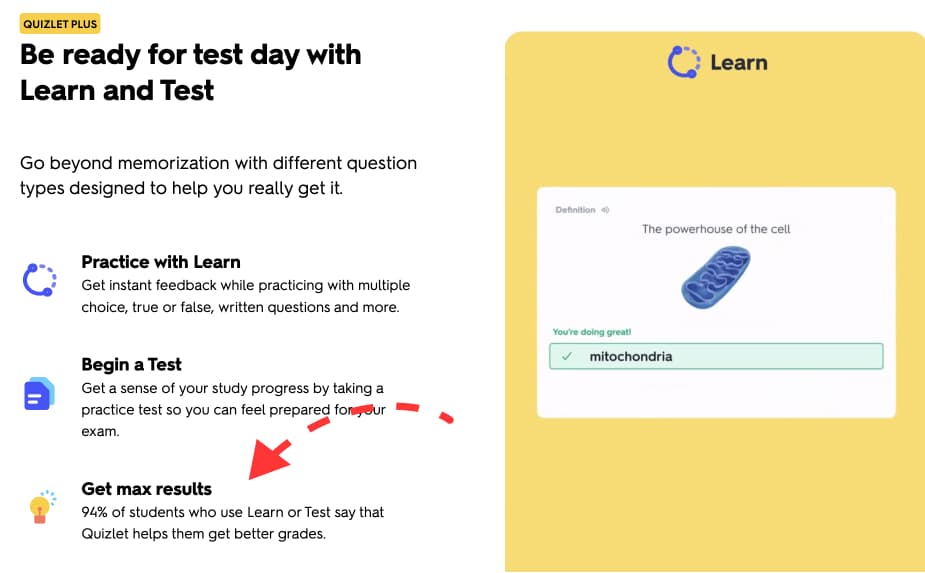
16. Customer video testimonials and references
Picture a hotel website that features positive guest reviews – it encourages bookings by instilling confidence in potential guests.
By showcasing authentic experiences and satisfaction, these customer references validate the hotel’s quality and service.
Prospective guests are more likely to trust the opinions of fellow customers, making these testimonials a persuasive tool in influencing their decision to book a stay.
On top of this, examples of customer preferences in video testimonials are one of the most powerful ways to showcase social proof on your website.
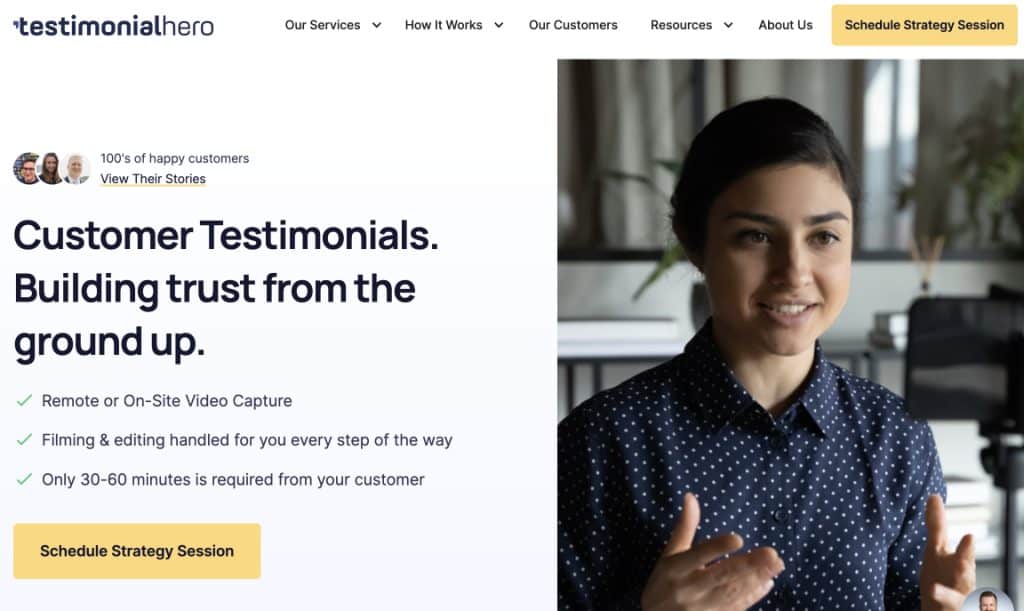
17. Real-time stats
Real-time stats are a powerful tool for creating urgency and credibility. For instance, an e-commerce website displaying the number of items sold in real time generates a compelling sense of urgency for potential customers.
Seeing the live updates of items being purchased instills the fear of missing out and validates the popularity and demand for the product. This social proof encourages visitors to make a purchase promptly, driven by the desire to be part of a trending item.
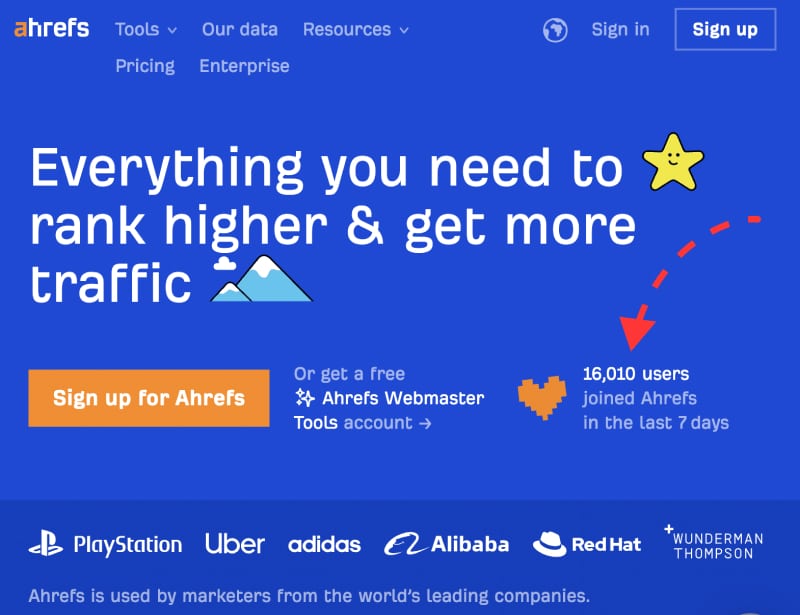
18. Community engagement
For example, a social media platform highlighting active user engagement attracts new users by showcasing vibrant interactions and discussions. Demonstrating a lively community fosters a sense of belonging and credibility, encouraging potential users to join and participate. This social proof emphasizes the platform’s value and affirms its relevance, making it an appealing choice for individuals seeking an engaging online community.
Just take a look at the homepage created by the AI content generator Jasper. They showcased the power of their community with 100,000+ users and its value in providing evidence of the platform’s success.
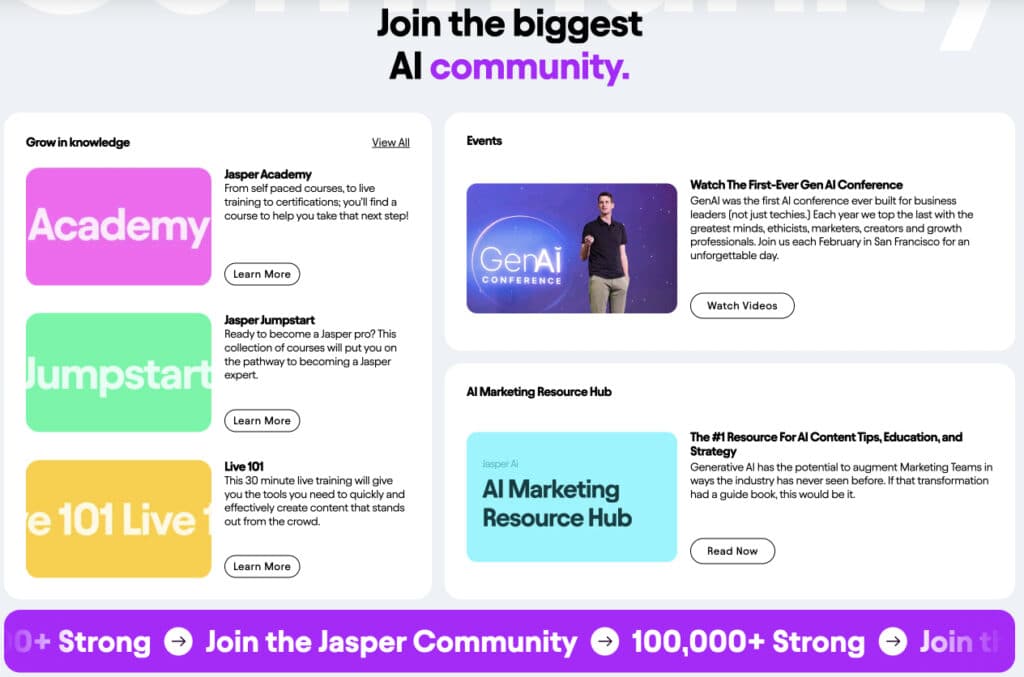
19. Awards and recognitions
For instance, a restaurant showcasing its prestigious culinary awards attracts diners by reinforcing its reputation for excellence. These accolades symbolize expertise and quality, instilling confidence in potential diners.
By prominently featuring such awards, the restaurant establishes itself as a trusted choice among discerning customers, leveraging social proof to attract individuals seeking an exceptional dining experience.
Talking of restaurants, what better achievement than not 1 but 3 Michelin stars to display on the website?

20. Positive social impact
Highlighting positive social impact is another great example of showcasing social proof. For example, a sustainable fashion brand showcasing its environmentally friendly practices appeals to conscious consumers.
The brand establishes itself as a responsible choice by emphasizing its commitment to sustainability, such as using eco-friendly materials and ethical production.
This social proof aligns with the values of conscious consumers, making the brand more appealing and trustworthy in their eyes.
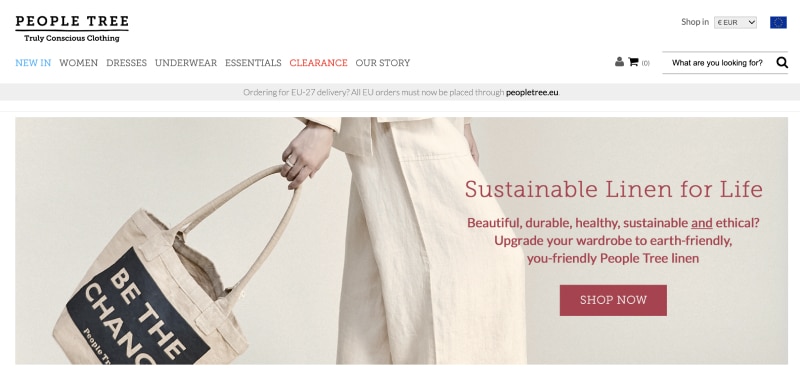
21. Social media followers and social media shares
Social media followers and shares are great indicators of popularity. When a brand boasts a large social media following and numerous shares, it signifies widespread interest and engagement.
This increased visibility enhances brand awareness as the content reaches a broader audience through shares, ultimately strengthening its social proof. A brand with a significant social media presence enjoys heightened credibility and appeal, influencing potential customers to engage with and trust the brand.
Check out how many followers Hubspot has:
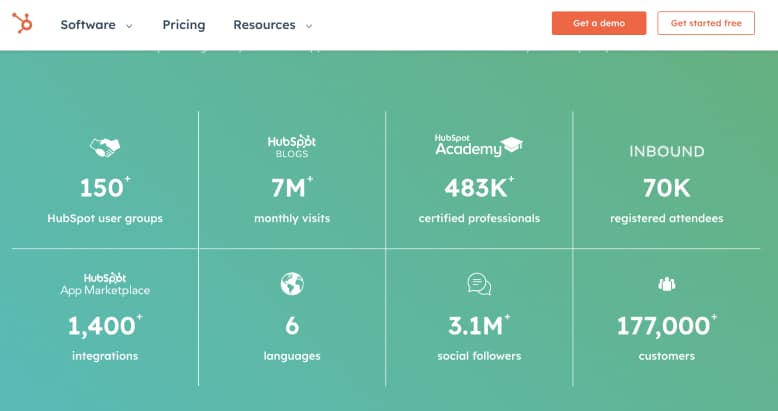
How to collect social proof from social media platforms?
Having social media posts about your brand published by satisfied customers is a gold mine when looking to build social-proof widgets for your website.
And now, it is possible to collect social proof using API-approved social media aggregators like EmbedFeed. Also, as a platform, EmbedSocial can collect and embed all Instagram photos containing your product published by actual customers. It works with every major social media platform and provides a variety of widgets to embed user-generated content on your landing pages.
EmbedSocial’s solutions are perfect for eCommerce brands operating in a competitive industry where direct customer relationships make all the difference. You may find other social proof tools offered by competitors, but none have managed to offer as much as possible for as little as possible.
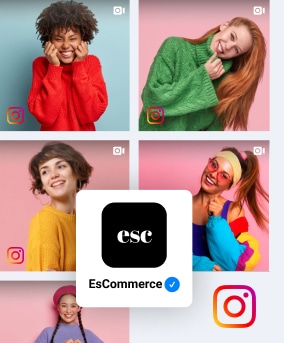
Show social media wall on your website automatically!
Try EmbedFeed and display Instagram, Facebook, YouTube, Pinterest, TikTok, and Vimeo feeds on your website in seconds.
All PRO features | Cancel any time.
Use Social Proof to Gain More Potential Customers.
These are far from the only social proof examples out there. You can leverage your product if someone is endorsing or otherwise publicizing it. Social proof works.
Sometimes, the best social proofs happen completely naturally, and you must reach out to the creator. So, keep a close eye on your hashtag on social channels, read reviews from your current customers, follow press mentions, or set up a keyword alert for product mentions on Google.
The more social proof you can get, the better. And remember, even ‘bad’ social proof can work to your advantage. It often lends legitimacy to your product – especially if you can respond to a bad review correctly.
Experiment with third-party content, leverage social proof in your marketing strategy, and see what it can do for your business.
The psychology behind social proof: how does it actually work?
Social proof is a powerful psychological phenomenon that influences human behavior and plays a huge part in the decision-making process. Understanding the underlying psychological principles can illuminate why social proof effectively shapes our actions and choices.
Let’s dive into the psychological principles that make social proof effective.
Social validation
Humans have a natural tendency to seek social validation and conform to the actions and behaviors of others. When we see others engaging in a particular behavior or making a specific choice, we assume it to be correct or desirable, leading us to follow suit. Social proof leverages this need for validation to influence our decisions.
Cognitive biases
The social evidence exploits various cognitive biases that affect our judgment. The bandwagon effect, for example, occurs when people adopt certain behaviors or beliefs because they see others doing the same.
Informational social influence, another cognitive bias, arises when individuals rely on others’ actions and choices to gather information and make decisions.
Reduced uncertainty
When faced with uncertainty or indecision, social proof serves as a shortcut for decision-making. By observing the behavior of others, we infer that they possess knowledge or information that we lack. This reduces our uncertainty and increases our confidence in making similar choices.
Now that we’ve covered the principles that make social proof effective, let’s see the role of “Fear of Missing Out” (FOMO) in social proof.
FOMO is a pervasive feeling of anxiety or apprehension that arises from the fear of missing out on rewarding experiences, opportunities, or social connections. In the context of social proof, FOMO plays a crucial role in intensifying the influence of social proof on our decisions. Here’s how:
Validation and acceptance
FOMO drives us to seek validation and acceptance from our social circles. When we see others participating in a particular trend or activity, we fear being left out and excluded. Social proof capitalizes on this fear by showcasing others’ participation, thereby triggering our desire to conform and be accepted.
Scarcity and urgency
FOMO is closely linked to the perception of scarcity and urgency. When we witness others engaging in limited-time offers, exclusive events, or high-demand products, our fear of missing out on these opportunities becomes heightened. Social proof can create a sense of urgency by displaying real-time or recent activity, such as live purchases or limited stock availability, leading us to take immediate action.
Information and influence
FOMO amplifies the influence of social proof by making us believe that others possess valuable information or insights that we might miss out on. The fear of being left behind or not being part of the conversation pushes us to align our choices with the perceived majority.
Understanding the psychological principles behind social proof and recognizing the impact of FOMO allows businesses and individuals to leverage these concepts effectively.
When you strategically utilize social proof and address the underlying fear of missing out, you can shape behavior, build credibility, and drive desired actions in a variety of contexts.
Frequently asked questions about social proof
Social proof is important because it influences people’s decisions and behaviors. When people see others using a product or service, they are more likely to trust and use it themselves. It’s a powerful tool for building trust and credibility.
Examples of social proof include customer testimonials, online reviews, social media shares, celebrity endorsements, and case studies, all of which prove a product’s or service’s value.
In marketing, social proof shows potential customers that others trust and value a product or service. This can be done through testimonials, reviews, endorsements, and more. It helps build trust and credibility, making people more likely to purchase.
You can use social proof in your business by collecting and showcasing testimonials, reviews, endorsements, and case studies. You can also leverage social media to show how many people use and talk about your product or service.
FYI: You can automatically embed Google reviews widget on your website and show authentic user-generated reviews, increasing trust for more sales. Try it now.










